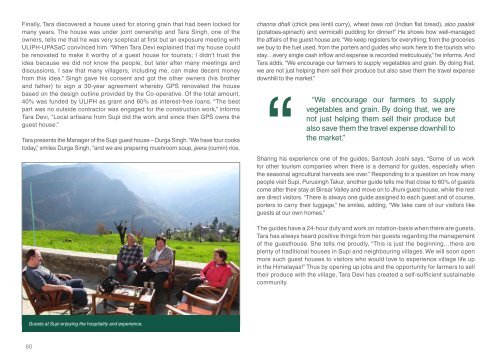Trail Blazers - IFAD
Trail Blazers - IFAD
Trail Blazers - IFAD
Create successful ePaper yourself
Turn your PDF publications into a flip-book with our unique Google optimized e-Paper software.
Finally, Tara discovered a house used for storing grain that had been locked for<br />
many years. The house was under joint ownership and Tara Singh, one of the<br />
owners, tells me that he was very sceptical at first but an exposure meeting with<br />
ULIPH-UPASaC convinced him. “When Tara Devi explained that my house could<br />
be renovated to make it worthy of a guest house for tourists; I didn’t trust the<br />
idea because we did not know the people, but later after many meetings and<br />
discussions, I saw that many villagers, including me, can make decent money<br />
from this idea.” Singh gave his consent and got the other owners (his brother<br />
and father) to sign a 30-year agreement whereby GPS renovated the house<br />
based on the design outline provided by the Co-operative. Of the total amount,<br />
40% was funded by ULIPH as grant and 60% as interest-free loans. “The best<br />
part was no outside contractor was engaged for the construction work,” informs<br />
Tara Devi, “Local artisans from Supi did the work and since then GPS owns the<br />
guest house.”<br />
Tara presents the Manager of the Supi guest house – Durga Singh. “We have four cooks<br />
today,” smiles Durga Singh, “and we are preparing mushroom soup, jeera (cumin) rice,<br />
channa dhall (chick pea lentil curry), wheat tawa roti (Indian flat bread), aloo paalak<br />
(potatoes-spinach) and vermicelli pudding for dinner!” He shows how well-managed<br />
the affairs of the guest house are. “We keep registers for everything: from the groceries<br />
we buy to the fuel used, from the porters and guides who work here to the tourists who<br />
stay…every single cash inflow and expense is recorded meticulously,” he informs. And<br />
Tara adds, “We encourage our farmers to supply vegetables and grain. By doing that,<br />
we are not just helping them sell their produce but also save them the travel expense<br />
downhill to the market.”<br />
“<br />
“We encourage our farmers to supply<br />
vegetables and grain. By doing that, we are<br />
not just helping them sell their produce but<br />
also save them the travel expense downhill to<br />
the market.”<br />
Sharing his experience one of the guides, Santosh Joshi says, “Some of us work<br />
for other tourism companies when there is a demand for guides, especially when<br />
the seasonal agricultural harvests are over.” Responding to a question on how many<br />
people visit Supi, Purusingh Takur, another guide tells me that close to 60% of guests<br />
come after their stay at Binsar Valley and move on to Jhuni guest house, while the rest<br />
are direct visitors. “There is always one guide assigned to each guest and of course,<br />
porters to carry their luggage,” he smiles, adding, “We take care of our visitors like<br />
guests at our own homes.”<br />
The guides have a 24-hour duty and work on rotation-basis when there are guests.<br />
Tara has always heard positive things from her guests regarding the management<br />
of the guesthouse. She tells me proudly, “This is just the beginning…there are<br />
plenty of traditional houses in Supi and neighbouring villages. We will soon open<br />
more such guest houses to visitors who would love to experience village life up<br />
in the Himalayas!” Thus by opening up jobs and the opportunity for farmers to sell<br />
their produce with the village, Tara Devi has created a self-sufficient sustainable<br />
community.<br />
Guests at Supi enjoying the hospitality and experience.<br />
60

















